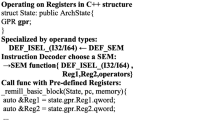Abstract
This paper describes a novel technique to defend binaries against intra-frame stack-based attacks, including overflows into local variables, when source code is unavailable. The technique infers a specification of a function’s stack layout, i.e., variable locations and boundaries, and then seeks to apply a combination of transformations, including variable reordering, random-sized padding between variables, and placement of canaries. To overcome the imprecision of static binary analysis, yet be as aggressive as possible in the transformations applied to the stack layout, the technique is speculative. A stack frame is aggressively transformed based on static analysis, and the validity of inferred stack layout is assessed through regression testing. If a transformation changes a program’s semantics because of imprecision in the inference of the stack layout, a less aggressive layout is inferred until the transformed program passes the supplied regression tests. We present an overview of the technique and preliminary results of its feasibility and security effectiveness.
Access this chapter
Tax calculation will be finalised at checkout
Purchases are for personal use only
Preview
Unable to display preview. Download preview PDF.
Similar content being viewed by others
References
Bhatkar, S., DuVarney, D.C., Sekar, R.: Address obfuscation: An efficient approach to combat a broad range of memory error exploits. In: Proceedings of the 12th Conference on USENIX Security Symposium, vol. 12, pp. 105–120. USENIX Association, Berkeley (2003)
Bhatkar, S., Sekar, R.: Data Space Randomization. In: Zamboni, D. (ed.) DIMVA 2008. LNCS, vol. 5137, pp. 1–22. Springer, Heidelberg (2008)
Bhatkar, S., Sekar, R., DuVarney, D.C.: Efficient techniques for comprehensive protection from memory error exploits. In: Proceedings of the 14th Conference on USENIX Security Symposium, vol. 14, pp. 255–270. USENIX Association, Berkeley (2005)
Chen, S., Xu, J., Sezer, E.C., Gauriar, P., Iyer, R.K.: Non-control-data attacks are realistic threats. In: USENIX Security Symposium, pp. 177–192 (2005)
Hiser, J.D., Coleman, C.L., Co, M., Davidson, J.W.: MEDS: The Memory Error Detection System. In: Massacci, F., Redwine Jr., S.T., Zannone, N. (eds.) ESSoS 2009. LNCS, vol. 5429, pp. 164–179. Springer, Heidelberg (2009)
Scott, K., Kumar, N., Velusamy, S., Childers, B., Davidson, J.W., Soffa, M.L.: Retargetable and reconfigurable software dynamic translation. In: Proceedings of the International Symposium on Code Generation and Optimization: Feedback-directed and Runtime Optimization, CGO 2003, pp. 36–47. IEEE Computer Society, Washington, DC (2003)
The PAX Team, http://pax.grsecurity.net
Van Acker, S., Nikiforakis, N., Philippaerts, P., Younan, Y., Piessens, F.: ValueGuard: Protection of Native Applications against Data-Only Buffer Overflows. In: Jha, S., Mathuria, A. (eds.) ICISS 2010. LNCS, vol. 6503, pp. 156–170. Springer, Heidelberg (2010)
Wilander, J., Kamkar, M.: A comparison of publicly available tools for dynamic buffer overflow prevention. In: Proceedings of the Network and Distributed System Security Symposium, NDSS. The Internet Society (2003)
Author information
Authors and Affiliations
Editor information
Editors and Affiliations
Rights and permissions
Copyright information
© 2013 Springer-Verlag Berlin Heidelberg
About this paper
Cite this paper
Rodes, B.D., Nguyen-Tuong, A., Hiser, J.D., Knight, J.C., Co, M., Davidson, J.W. (2013). Defense against Stack-Based Attacks Using Speculative Stack Layout Transformation. In: Qadeer, S., Tasiran, S. (eds) Runtime Verification. RV 2012. Lecture Notes in Computer Science, vol 7687. Springer, Berlin, Heidelberg. https://doi.org/10.1007/978-3-642-35632-2_29
Download citation
DOI: https://doi.org/10.1007/978-3-642-35632-2_29
Publisher Name: Springer, Berlin, Heidelberg
Print ISBN: 978-3-642-35631-5
Online ISBN: 978-3-642-35632-2
eBook Packages: Computer ScienceComputer Science (R0)




